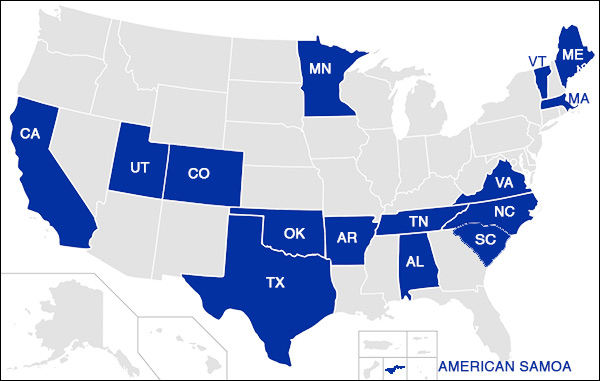
Super Tuesday 2020 States & Territories
By Jim Ellis
March 3, 2020 — The election landscape has changed since Saturday with former mayor Pete Buttigieg, Sen. Amy Klobuchar (D-MN), and billionaire Tom Steyer all exiting the race. Sen. Klobuchar endorsed former vice president Joe Biden as did Buttigieg in an announcement last night.
How do these developments and an obvious Joe Biden resurgence affect today’s vote? Maybe not as much as meets the eye. With the early voting processes well underway, and even completed in some states, the late-breaking political news and happenings will influence far fewer voters.
In fact, the three largest states with primaries today, California (415 first-ballot delegates), Texas (228), and North Carolina (110), all have extensive early voting options and large percentages of their voters have already cast their ballots meaning Biden’s sudden upswing in momentum after his South Carolina victory on Saturday night won’t sway them.
In California, more than 2 million people have already voted, which may translate into as much as one-third of the total Democratic presidential primary turnout. In 2016, more than 5.1 million people voted in the Hillary Clinton-Bernie Sanders race in June of that year. Returning to today, more than one million have already voted in Texas, and 800,000-plus have cast their ballots in North Carolina.
Thirty-eight states have some form of early voting, even if it is merely an in-person absentee system like those found in Minnesota and Virginia. For Super Tuesday, of the 14 states with primary elections today, only Alabama and Colorado have no early voting. The latter state fully conducts all-mail balloting but has no pre-election process in which to submit votes.
Looking at the current political map, though the establishment is making moves to coalesce behind Biden, the latest polling suggests that Sen. Sanders leads in nine primaries today and it’s possible, even with the candidate departures, that as many as three contenders in almost all of the states could still qualify for delegate apportionment.
Today will also mark the first time that former New York City mayor Michael Bloomberg’s name will be on the ballot and how he fares will be telling. Depending upon how many votes he takes could prevent one of the leading candidates from securing majority support, meaning the race evolving into a contested national convention is still a possibility.




 Feb. 25, 2020 — While the Nevada Caucus counting drags on and tabulations will at some point determine just how many delegates Sen. Bernie Sanders (I-VT), former Vice President Joe Biden, and ex-Mayor Pete Buttigieg receive from the state – currently, it appears that Sanders will win somewhere between 19 and 23 bound delegate votes, while Biden and Buttigieg should both earn bound votes in the high single digits – a new US Senate poll is proving more curious today.
Feb. 25, 2020 — While the Nevada Caucus counting drags on and tabulations will at some point determine just how many delegates Sen. Bernie Sanders (I-VT), former Vice President Joe Biden, and ex-Mayor Pete Buttigieg receive from the state – currently, it appears that Sanders will win somewhere between 19 and 23 bound delegate votes, while Biden and Buttigieg should both earn bound votes in the high single digits – a new US Senate poll is proving more curious today.